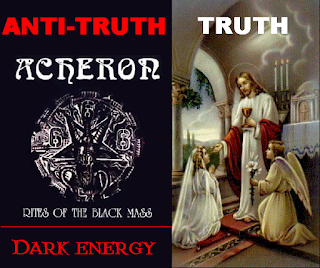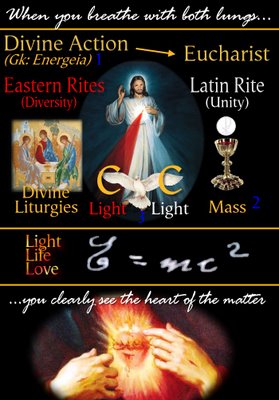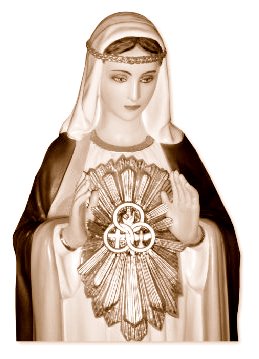The following entries are "fruit," first bad and then good, of a GOOGLE Search on Eucharist, energy. I offer them here for your edification and discernment, to make the case that Catholics better pay attention to the attack of the evil one (Lucifer/Satan/Devil, a.k.a. LSD).
Anti-Truth
Why Communion is a Satanic Ritual « Custodial Smackdown
Aug 4, 2008 ... Jesus did not want anything resembling the Eucharist, ... a perverse practice that only degrades spiritual energy, instead of uplifting it. ...
________________________________
Thelemic-Hermetic Magical Rite of the Eucharist
Fire = energy or tendency to reach a higher energy state. .... I invoke y’all to guide me in this spell (or rite of the Eucharist) that I may perfectly ...
And these three are just the proverbial "tip of the iceberg!"
____________________________________________________________
Truth
MIRAE CARITATIS (On the Holy Eucharist)
May 28, 1902
Pope Leo XIII
To examine into the nature and to promote the effects of those manifestations of His
wondrous love which, like
rays of light, stream forth from Jesus Christ—this, as befits Our sacred office, has ever been, and this, with His help, to the last breath of
Our life will ever be Our earnest aim and endeavour.
13. That genuine charity, therefore, which knows how to do and to suffer all things for the salvation and the benefit of all,
leaps forth with all the heat and energy of a flame from that most holy
Eucharist in which Christ Himself is present and lives, in which He indulges to the utmost. His love towards us, and under the impulse of that divine love ceaselessly renews His Sacrifice. And thus it is not difficult to see whence the arduous labours of apostolic men, and whence those innumerable designs of every kind for the welfare of the human race which have been set on foot among Catholics, derive their origin, their strength, their permanence, their success.
http://www.adoremus.org/MiraeCaritatis.html
________________________________
SACRAMENTUN CARITATIS (The Sacrament of Charity)
March 13, 2007
Pope Benedict XVI
Through the concrete fulfilment of this responsibility, the Eucharist becomes in life what it signifies in its celebration. As I have had occasion to say, it is not the proper task of the Church to engage in the political work of bringing about the most just society possible; nonetheless she cannot and must not remain on the sidelines in the struggle for justice. The Church "has to play her part through rational argument and she has to reawaken the spiritual energy without which justice, which always demands sacrifice, cannot prevail and prosper." (244)
_______________________________________
Message of the Synod of Bishops on the Eucharist
"The Eucharist: Living Bread for the Peace of the World"
VATICAN CITY, OCT. 22, 2005 (ZENIT.org).-During the Twentieth General Congregation held yesterday, Friday 21th October 2005, the Synodal Fathers approved the Message of the Synod of Bishops to the People of God, at the conclusion of the XI Ordinary General Assembly of the Synod of Bishops.
You are the «sentinels of the morning» and the «explorers of the future.» Do not fail to draw from the source of
divine energy in the
Holy Eucharist to bring about the changes that are necessary.
http://www.zenit.org/english/visualizza.phtml?sid=78713
_______________________________________
In the
Eucharist God is giving us the power to live as we are meant to live, sharing, loving, and forgiving like Jesus. In this special meal God is filling us with his
love, his life and his light.
God is light, God is life, God is love. You are precious to God, you are his beloved child. Know that God is always with you, always looking on you in love, always waiting for you be still and turn to him so he can fill you full of his light, his love, his life…
As you continue to breathe slowly and deeply feel God’s loving warmth and light and energy inside you, filling you to overflowing, spilling out, shining all around you, ready to share with everyone you meet, bringing God’s love and life to others, spreading Christ’s light in the world, making others feel welcome and special, bringing out the best in others, like Jesus… Know that even when we leave our prayer, when we stop being still, when we stop thinking about God, God’s light and love is always with us, God is always with us, always loving us. Resolve to make time every day to be aware of God’s presence, to be still and receive his love.
(Jenny Gray Jan 2008)
_______________________________________
The effect of our resources, Eucharistic Adoration, is the fire that lights the hearts of the faithful. Mother Teresa said, “We cannot separate our lives from the Eucharist; the moment we do, something breaks. People ask, ‘Where do the sisters get the joy and energy to do what they are doing?’” Indeed, such joy and energy can only come from the Eucharist, which, according to St. Peter Julian Eymard, “[i]n one day...will make you produce more for the glory of God than a whole lifetime without it.”
Every morning Mother spent at least two hours with us before the Blessed Sacrament in prayer and meditation, and one hour in the evening in the adoration of Jesus in the Blessed Sacrament, which filled her with diving light, love and energy to recognise, love and serve Him in the poorest of the poor."
_______________________________________
1. Why does Jesus come to us in the Eucharist?
Jesus comes to us in the Eucharist to give us new spiritual energy so that we can continue leading good Christian lives. (CC 1391-1392)
The Eucharist is the priest's source of spiritual energy to keep on serving. It is the source of his ministry of reconciliation and healing.
_______________________________________
Conclusion
The "lights" and the "shadows" in our eucharistic faith and practice indicate the need to treasure anew the greatest gift which Christ gives to us in the Church, the Holy Eucharist. New enthusiasm and new energy in studying and living our Catholic faith leads, first of all, to new enthusiasm and energy in contemplating the "eucharistic face" of Christ. Through the new evangelization, the "lights" of our eucharistic faith and practice will be enhanced and the "shadows" will be eliminated. May reflection upon the mystery of Christ’s abiding presence with us in the Eucharistic Sacrifice and banquet be at the heart of our work to carry out the new evangelization of our world.
_______________________________________
First of all, holy Communion increases and energizes and strengthens the life of Christ in us. Our whole relationship with God depends on the life of Christ in us, on what we call grace. Without grace, we are out of touch with God, on our own to sink or swim as best we can with energies and capabilities that are simply insufficient for the challenges we face. Moreover, grace is what qualifies us for heaven, what makes us capable of the contact with God that provides our eternal happiness. The food of the Eucharist is a source of life and energy for our spirits just as material food is a source of life and energy for our bodies. It makes us grow in grace and thus grow in our aptitude for heaven.
_______________________________________
The Holy Eucharist: With Other Occasional Papers
By Philip Napier Waggett
Published by The Young Churchman Co., 1908
Energy of Reception
The thought therefore of a common unity of reception, without difference, without energy, sweet as it is, is not a thought we may rest in as true by itself alone. It may not give us rest. Rather by the very echo of that great warning of the sacred past it bids us wake and pray.
And as we pray, it is made clear to us in the second place that Holy Communion is for us something more than an experience which is passive and uniform, and uniform because passive. Besides being a blessing in which all alike share because all alike simply receive, and find therefore no room for difference, for all eat the same spiritual meat, this holy Sacrament is that which demands, and makes possible while it demands, a certain energy in the recipient. And in this call for energy, this possibility of spiritual movement in those who feed, lies the possibility also of difference in the profit of their feeding. For where obedience may grow in the God-given merit of action, there also sloth may claim its spoil; there also fear may rob the soul of its prize. There not only may actual obstacles bar the clear road of Grace, but mere inaction may lose what the strength of the soul should have been put forth to acquire.
For indeed in this most holy feast our Divine Lord, bestowing grace upon us, bids us rise and act. It is an energy of acceptance which He evokes. " Do this," He commands, in the first revelation of the Communion. " This is the work of God." "Labour for that meat which abideth unto everlasting life."
For just as in natural feeding there is no strictly passive reception, but rather an energising of the power of life to claim and appropriate the food which shall sustain its strength—the strength which remains seeking the strength which is to come—even so, but always by Divine grace given, is it in Communion. Mere nature indeed can make no approach to this food. In nature we are not exhausted only or lying in uttermost faintness, but dead. The dead can neither feed nor hunger. But by the grace of God, by the revival of the regenerate life, the Christian soul and body, though faint and weak, are yet faint with hunger, and in uttermost weakness yet are called upon for an act. "Open thy mouth," cries our God in the accents of a mother who yearns over her fainting child; "Open thy mouth wide, and I will feed thee."
So by God's gift there is the possibility, and by God's invitation and command there is the duty, of a genuine energy and work of the soul in coming to Communion. Yes; we are to reach out after that Heavenly Bread which is our Saviour, God and Man—God possessing our nature, manhood filled with the Divine majesty. He Who is not only our Shepherd leading us to pastures where we may find our nourishment, not only our Lord bestowing bread from Heaven, angels' food upon our need ; He Who is Himself our Bread, stands at the Right Hand of Power ready to feed us thence, to feed us there. He is able to make us sit with Him there in Heavenly places, while He enters also into our hearts, that He may sup with us and we with Him. But with the offered feast, He bestows also the power to open doors to His coming. With the offered shelter of His Heart, He bestows also such a faculty as He may address in command, saying, "Abide in Me." He does not take from His own in the bounty of Communion the power of a personal activity. Rather now, by the substance of past Communions (which yet are not passed away), by the inborn vigour of the new birth, by the breath of the Spirit moving in Him the Head and in us the members, He opens the way and He requires the effort of a genuine act of seeking, of reception, of spiritual manducation; and it is in the growing freedom of this energetic acceptance that the effect of the Heavenly gift grows in those who are taught of God.
O, that we might thus increase in Heavenly wisdom, and in the power of God's might. Send forth, O Lord, Thy light and Thy truth that they may lead me, that I may indeed go unto the Altar of God and reach the full enjoyment of Thy plenty. It is by the outflowing rays of Divine Glory that we must be led home to the Divine Source. Safely shall we follow towards Him those streams which flow from Him. Show unto me, O most bountiful Lord, in the Incarnate life the rays of Thy Majesty, that following along the path they create, pursuing that Way of Life which Jesus indeed is, I may arrive in constant energy of Communion at the Fountain of Light in Him.
_______________________________________
The Holy Eucharist supplies us with spiritual energy for the apostolate. It punctuates the major milestones in our personal and community life and is with us at the evening of our earthly pilgrimage.
Considering that “the Church draws her life from Christ in the Eucharist, by him she is fed and by him she is enlightened” (Eccl. De Euch., 6), it follows that the Eucharist “stands at the centre of the Church’s life” (Eccl. De Euch., 3). Pope Paul VI had earlier made an observation in the same sense: “If the sacred liturgy holds first place in the life of the Church, then the Eucharistic Mystery stands at the heart and centre of the liturgy, since it is the font of life that cleanses us and strengthens us” (Mysterium Fidei, 2).
Eucharist: Spiritual Energy for Apostolate
The Holy Eucharist sends us on mission. At the end of Mass, the deacon, and in his absence the priest, says to us: “Ite Missa Est”. This really means: “Go, you are sent to live and share what you have received and what we have heard, meditated, sung and prayed”. The Holy Eucharist sends us to proclaim Christ, each according to that person’s vocation and mission in the Church and in the world. The witness of our lives and our word when that is called for, will show that we are followers of Christ. This is an obligation on everyone in the Church: lay faithful, cleric or man or women in the consecrated state.
Holy Eucharist at Sunset of Earthly Pilgrimage
There comes a time when indications begin to increase to show that the end of our earthly life is not far away. Strength begins to fail. The bones start to ache. Movement slows down each day. One sickness or the other is detected. In short, the evening, the twilight, the sunset of our earthly pilgrimage is beginning to unfold.
As all through life starting from infancy, so also in old age the Holy Eucharist is central to our Christian life. Jesus accompanies us with this sacrifice and sacrament. The Church sets great value on the apostolate of the hospital chaplains who celebrate mass for the sick in hospitals or homes for the elderly and bring them Holy Communion. The sick or the old in their homes are also brought the comforting visit of their Eucharistic Lord.
When death is near, the Holy Eucharist is administered to the dying as Viaticum, to strengthen the dying and accompany him or her on the journey to eternity.
Francis Cardinal Arinze
November 19, 2005
_______________________________________
Everyone who wants to fight abortion needs to say the same. We need to exercise the same generosity we ask the mothers to exercise. We need to imitate the mysteries we celebrate. "Do this in memory of me" applies to all of us in the sense that we are to lovingly suffer with Christ so others may live. We are to be like lightning rods in the midst of this terrible storm of violence and destruction, and say, "Yes, Lord, I am willing to absorb some of this violence and transform it by love into personal suffering, so that others may live."
Indeed, the Eucharist gives the pro-life movement its marching orders. It also provides the source of its energy, which is love. Indeed, if the pro-life movement is not a movement of love, then it is nothing at all. But if it is a movement of love, then nothing will stop it, for "Love is stronger than death, more powerful even than hell" (Song of Songs 8:6).
Fr. Frank A. Pavone, National Director, Priests for Life
_______________________________________
Thus it is a holy and lifegiving thing, full of divine energy. And we too are transformed in Christ, the first-fruits, to be above corruption and sin. What the blessed Paul says is true: “Just as we bore the image of the earthly, so shall we bear the image of the heavenly” (1 Cor 15:49) that is to say, of Christ.
________________________________________________
Sincerely yours in Jesus and Mary,
Mike Rizzio, SOLT
Imitate Mary
Become like Jesus
Live for the Triune God
Seek the Light of Our Lord Jesus Christ
See you on the High Ground!
* - J.M.J. + O.B.T. + M.G.R. stands for: Jesus, Mary and Joseph;
O Beata Trinitas; St. Michael, St. Gabriel and St. Raphael































No comments:
Post a Comment